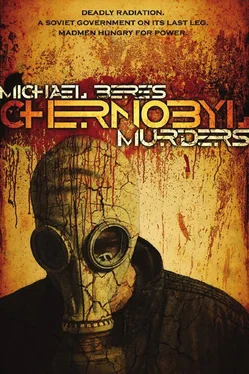Michael Beres - Chernobyl Murders
Здесь есть возможность читать онлайн «Michael Beres - Chernobyl Murders» весь текст электронной книги совершенно бесплатно (целиком полную версию без сокращений). В некоторых случаях можно слушать аудио, скачать через торрент в формате fb2 и присутствует краткое содержание. Жанр: Триллер, на английском языке. Описание произведения, (предисловие) а так же отзывы посетителей доступны на портале библиотеки ЛибКат.
- Название:Chernobyl Murders
- Автор:
- Жанр:
- Год:неизвестен
- ISBN:нет данных
- Рейтинг книги:4 / 5. Голосов: 1
-
Избранное:Добавить в избранное
- Отзывы:
-
Ваша оценка:
- 80
- 1
- 2
- 3
- 4
- 5
Chernobyl Murders: краткое содержание, описание и аннотация
Предлагаем к чтению аннотацию, описание, краткое содержание или предисловие (зависит от того, что написал сам автор книги «Chernobyl Murders»). Если вы не нашли необходимую информацию о книге — напишите в комментариях, мы постараемся отыскать её.
Chernobyl Murders — читать онлайн бесплатно полную книгу (весь текст) целиком
Ниже представлен текст книги, разбитый по страницам. Система сохранения места последней прочитанной страницы, позволяет с удобством читать онлайн бесплатно книгу «Chernobyl Murders», без необходимости каждый раз заново искать на чём Вы остановились. Поставьте закладку, и сможете в любой момент перейти на страницу, на которой закончили чтение.
Интервал:
Закладка:
Perhaps sabotage or foreign intelligence played a part. Despite Gorbachev’s new policies of openness, Komarov felt the real powers in Moscow were intact. Unknown to Azef, Komarov had passed along the name of an American, one Andrew Zukor, who had visited Mihaly Horvath and his brother, Detective Lazlo Horvath, during the summer. He gave the name to Major Dmitry Struyev here in Kiev.
Struyev was a member of Directorate T and was interested in any Americans visiting the Soviet Union. Not only to keep track of them, but to use their presence for counterespionage if possible.
After Azef was gone, Komarov returned to the window. He stared out at the horizon to the west and thought again about the days in East Berlin. He recalled his knowledge of deep-cover operations. Projects to provoke American firearms organizations and turn them against their government. Projects to discredit U.S. presidents, including Ford and Carter. He had taken part in trying to compromise a U.S. diplomat in order to discredit Carter’s hawk ad-visor, Brzezinski. He knew about past projects involving U-2 spy planes and attempts to discredit Martin Luther King Jr., and even a more recent project with the Bulgarians to do something about the pope, who was causing trouble in Poland. But once he was transferred to Kiev, he felt cut off. Although he’d been aware of newer projects concerning Ronald Reagan and electrical sabotage on the U.S. East Coast and negative AIDS propaganda, he remained cut off from active measures once he moved to the Ukraine. Perhaps this is why he relished his time in East Berlin. Some time ago he had tried to share these feelings with Major Struyev, who maintained an office one floor down. But because he was an operative of Directorate T, Struyev would share nothing. Struyev was an old hard-liner, older than Komarov, with more secrets than Komarov. Struyev would go to his grave with his secrets.
Komarov reached into his pocket, pulled out a cigarette, and lit it. He imagined Azef wagging a finger at him. When he thought of how Azef seemed to have all the answers and all the right files, he wondered if he was becoming paranoid, if he was becoming fearful of his assistant vying for his position. But what was paranoia except the drive for power, the need to be on top? Long ago Komarov concluded all truly powerful men had advanced because of paranoia, not in spite of it. Even Lenin.
Komarov sat at his desk and placed his lighted cigarette in the ashtray. He took out his keys, unlocked a side drawer, and opened it. Inside the drawer was his Walther 9mm West German automatic in its shoulder holster. The pistol was atop a notebook listing secret sources and informants throughout the years. He hadn’t used the pistol in years, and the notebook was long out of date, many of the persons having moved, or died.
He pulled the drawer out farther, reached into the cave of the drawer, and felt the fluted handle of the knife he knew would be there. He retrieved the knife, placed it on the desk, then closed and locked the drawer.
It was an antique German knife, not a war souvenir, a knife made before the war, before swastikas. It was nearly as long as his hand, and with the single blade unfolded from the handle, it was two hands long. The handle was inlaid with alabaster gone pale over the years. The knife was a souvenir given him by the deputy chairman of the East Berlin branch office as a memento of his success in the Sherbitsky affair. The knife had belonged to Captain Sherbitsky and was determined by the investigation to be the knife used by Sherbitsky to kill beautiful Gretchen and Agent Pudkov.
Every time Komarov touched the knife, he again felt the thrill of the case. How ironic the knife was presented as a reward to the creator of the Sherbitsky affair. Komarov rubbed his thumb back and forth on the alabaster handle, recalling the praise, the medal, and his elevation to captain, then major. But the knife, like him, had become a relic in the back of a drawer.
Komarov held the knife in both hands and slowly unfolded the blade. He wiped skin oil from his forehead-his receding hairline apparent-and applied the oil evenly to the blade with his fingers. He shined the blade on his trouser leg, carefully, because the blade was as sharp as it was when he pushed it deep into Gretchen’s abdomen while, at the same time, caressing her and staring into her eyes.
It happened at the “safe” house outside Berlin. Agent Pudkov, a devilishly handsome recruit, was using the “safe” house to rendezvous with Gretchen. Komarov had opened the door noisily.
They were naked and quickly pulled a blanket about them. Komarov feigned surprise, then smiled, saying he would wait in the hall, saying he would be next to share a bed with Gretchen. And he did wait. He waited until Pudkov came into the hall. The knife entered the flesh of Pudkov’s neck smoothly, the passion of a few moments before draining his blood quickly. Komarov held his hand over Pudkov’s mouth as he died and left him on the floor.
In the bedroom Komarov kept his hands behind him so Gretchen would not see his gloves and the bloodied knife. When he got into bed, Gretchen complained about his rough uniform and boots.
But she smiled when he spread her legs, touching her intimately with his leather-gloved hand. While she searched his eyes, staring at him without blinking, without shame, he thought of Barbara the Hungarian, who’d humiliated him. Pushing the knife home with his right hand, Komarov felt Gretchen’s legs close about the fingers of his left hand like a vise for a moment until the twisting of the knife drew the strength from her. Then he closed her eyes and slit her throat.
At his desk Komarov held the knife the way he’d held it when he ended Gretchen’s short but active life. Underhanded, his thumb along the length of its handle. He thought of the two ways smokers held their cigarettes. Between the two first fingers-western-or between finger and thumb-continental. The grip he used with his knife was elegant, just as the Sherbitsky affair was elegant. Even the bullet through Sherbitsky’s head was elegant. A shot from the front, a shot proving he had defended himself from the murderer. A shot fired in the woods several kilometers from the “safe” house at a man on the run.
After killing Sherbitsky and returning the knife to its rightful owner, the investigation commenced. It was an investigation ac-companied by the incessant weeping of Sherbitsky’s widow. In the end, when Sherbitsky’s known hotheadedness and jealousy were revealed, the case became so clear-cut even Komarov, while testifying, was able to momentarily suspend his true knowledge and feelings.
At the time he wondered if this ability to create, in his mind, an alternate reality was a sign of instability or schizophrenia. But this was not the case. Temporary alteration of reality was simply a method to survive the hearings unscathed. After all, he had killed a senior officer, and this killing had to be rigorously justified.
Recently, whenever Komarov thought of the Sherbitsky affair, he felt in a festive mood, but he could share the mood with only one friend, a friend who was not here because he dare not bring a bottle to his office. He saved his friend for evenings alone. In summer and most of the spring and fall, he spent evenings on the back porch of his house. Even when cold weather drove him indoors, even with his wife in the same room, he was alone with his friend because, while she watched her television, he would wall himself in and dream of success and triumph.
The cigarette in the ashtray had smoldered down to a couple of centimeters. He took one last suck on it and smashed it out. He folded the knife blade into its alabaster handle and put it into his inside jacket pocket, where it rested reassuringly against his chest.
Читать дальшеИнтервал:
Закладка:
Похожие книги на «Chernobyl Murders»
Представляем Вашему вниманию похожие книги на «Chernobyl Murders» списком для выбора. Мы отобрали схожую по названию и смыслу литературу в надежде предоставить читателям больше вариантов отыскать новые, интересные, ещё непрочитанные произведения.
Обсуждение, отзывы о книге «Chernobyl Murders» и просто собственные мнения читателей. Оставьте ваши комментарии, напишите, что Вы думаете о произведении, его смысле или главных героях. Укажите что конкретно понравилось, а что нет, и почему Вы так считаете.












